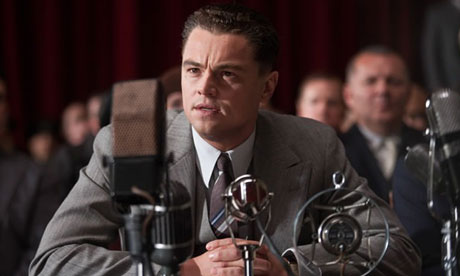
Leonardo DiCaprio in Clint Eastwood's J Edgar. Photo Credit: Keith Bernstein.
Clint Eastwood directs J. Edgar, a biopic revolving around the character J. Edgar Hoover, a very controversial historical figure. Renowned Leonardo DiCaprio stars in the titular role, playing young and old Hoover. Dustin Lance Black, another big name in the Hollywood world, was the screenwriter of this film.
The film starts out with the rise of Hoover’s career as he campaigns against the “communist revolutionaries” and is named head of the Bureau of Investigation. As the movie moves from Hoover becoming the head of the Bureau to fully establishing the bureau’s power, DiCaprio accurately portrays the ambition and single-mindedness of Hoover. The mysterious relationship between Hoover and several other characters were also interestingly illustrated throughout this film. In my opinion, the most interesting of these relationships depicted in the film was between Hoover and his “wingman”, Clyde Tolson.
Although there were several evident problems with the film, but the problem did not lie with script for the movie. Dustin Lance Black, an openly gay screenwriter, did not hesitate to include the gay undertones throughout the film, Hoover’s and Tolson’s tragic love story, and the poignant cross-dressing scene. Eastwood struggles to condense Hoover’s life into two hours of entertainment. Hoover’s numerous lifetime achievements and the mysteries and rumors that shrouded him cannot be compressed into one film. DiCaprio’s depiction of the older Hoover was very awkward because he tried too hard to sound like an old man but failed in his attempt. Other actors, such as Jeffrey Donovan, added unnecessary humor to the film. There were also several other inappropriate times throughout the film where my giggles had to be suppressed.
J. Edgar is a compelling look at the life of an extremely complicated and conflicted man. This film resembles another renowned cinematic masterpiece, Citizen Kane. Charles Foster Kane’s mother sent her son away so Kane could grow to be very successful. J. Edgar Hoover’s mother was very similar, in that she pushed Hoover to “regain the family name.” This burden imposed upon them caused the two characters to be very narrow-minded. Hoover and Kane were both respected by the people in their respective societies but no one truly knew the two people personally.
The two characters died alone with only their caretakers as their last companions. Although the scenes were similar, Hoover’s death, in contrast to Kane’s death seemed to be more significant. No one cried over Kane when he passed away but when Hoover died, he at least had Tolson’s tears. The shots of the rooms of the two characters were also very similar. The audience is guided through Hoover’s house filled with his collection of statues. Similarly, the audience is guided through Kane’s huge mansion to take a glimpse at the accumulation of random collectibles.
I would overall rate the film, J. Edgar a 6/10.
Comments
Leave A Comment